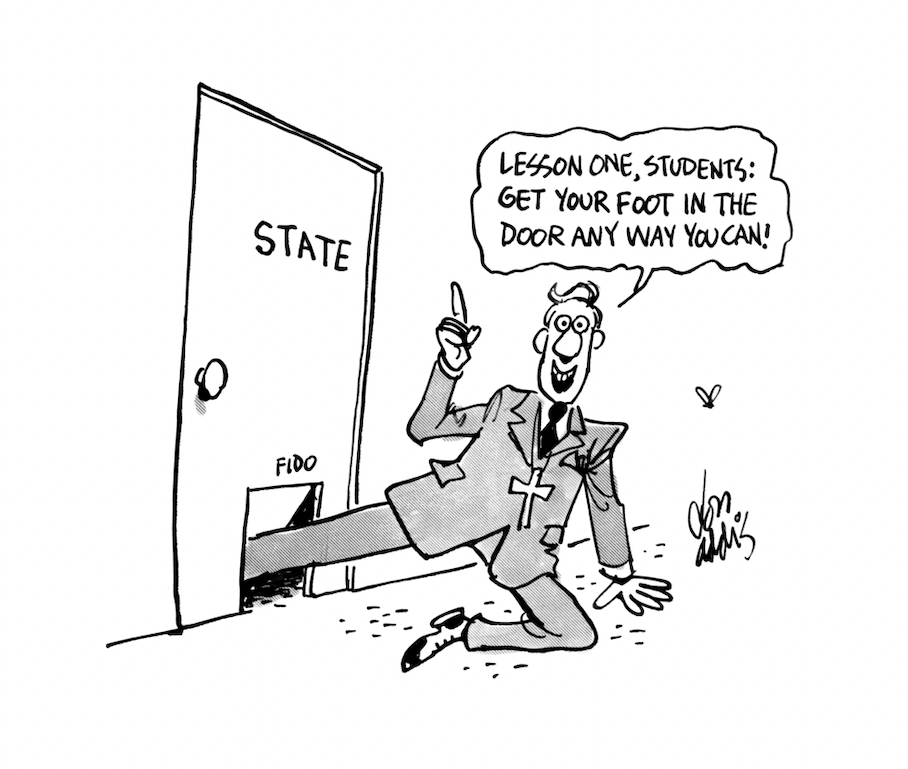
The Freedom From Religion Foundation has submitted written testimony to the Ohio Senate in opposition to a bill mandating a public school moment of silence.
SB 248 would impose a compulsory, daily moment of silence on Ohio public school students. Teachers are already free to offer a moment of silence if they determine that it would be beneficial for their students on a given day, and they are the right ones to make that call. Wresting control away from teachers is an improper overreach by the state, in conflict with the long-established tradition of local autonomy in public schools, FFRF contends.
Furthermore, this bill is an unconstitutional promotion of religion.
“More than 35 years ago, the U.S. Supreme Court considered a mandatory public school moment of silence and concluded that it ran afoul of the U.S. Constitution because the law stated that the time was to be used for ‘meditation or voluntary prayer,’” in Wallace v. Jaffree (1985), FFRF Staff Attorney Ryan Jayne writes to Sens. Andrew Brenner and Teresa Fedor, chair and ranking member, respectively, of the Senate Primary and Secondary Education Committee. “Similar to the Alabama law at issue in Wallace v. Jaffree, Ohio’s moment of silence law states that the moment of silence is ‘for prayer, reflection, or meditation upon a moral, philosophical or patriotic theme.’ The only difference is that Ohio’s law suggests prayer first rather than second, making the endorsement even more clear.”
Mandatory moment of silence bills are a trend around the country, and invariably they are described in terms of promoting religion. In Florida, Gov. Ron DeSantis signed a similar bill into law earlier this year, and said he viewed it as allowing students to “pray as they see fit,” describing the bill as a response to attempts to “push God out of every institution.” Just this week, South Dakota Gov. Kristi Noem introduced a mandatory public school moment of silence bill, stating that the intent was to “restore protections for prayer in the classroom.” These bills expose their respective states to litigation.
SB 248 is another bill in this line of open attempts to encourage students to pray. Any assertion that the bill is not motivated by an intent to promote religion is disingenuous, FFRF maintains. Confirming FFRF’s claim, at today’s hearing the only person speaking in support of SB 248 argued that the bill was important because it would bring prayer and God back into public schools.
As importantly, the Senate Primary and Secondary Education Committee should reject SB 248 because encouraging students to pray sends a message to nonreligious students that they are disfavored. A just-released survey has discovered that nonreligious Americans are the fastest growing segment of the U.S. population by religious identification — 37 percent of Americans are non-Christians, and this includes the 29 percent of Americans who now identify as religiously unaffiliated. Younger Americans are not just religiously unaffiliated, they are largely atheist or agnostic. Another survey found that 21 percent of Americans born after 1999 are atheist or agnostic.
FFRF’s principal founder, Anne Nicol Gaylor, always used to quip that the captive audience of public school students are already so regimented that what they need is a “moment of bedlam,” not a moment of silence, adds her daughter, Annie Laurie Gaylor, FFRF co-president. “This is the camel’s-nose-under-the-tent strategy that must be voted down by anyone who cares for children’s rights and our secular Constitution.”
Please respect students’ rights of conscience —and the autonomy of public schools — by rejecting SB 248, FFRF asks the Senate Primary and Secondary Education Committee in conclusion.
The Freedom From Religion Foundation is a national nonprofit organization with more than 35,000 members and several chapters across the country, including about 1,000 members in Ohio and two chapters in the state. FFRF protects the constitutional separation between state and church, and educates about nontheism.

